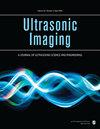Deep learning Radiomics Based on Two-Dimensional Ultrasound for Predicting the Efficacy of Neoadjuvant Chemotherapy in Breast Cancer
IF 2.5
4区 医学
Q1 ACOUSTICS
引用次数: 0
Abstract
We investigate the predictive value of a comprehensive model based on preoperative ultrasound radiomics, deep learning, and clinical features for pathological complete response (pCR) after neoadjuvant chemotherapy (NAC) for the breast cancer. We enrolled 155 patients with pathologically confirmed breast cancer who underwent NAC. The patients were randomly divided into the training set and the validation set in the ratio of 7:3. The deep learning and radiomics features of pre-treatment ultrasound images were extracted, and the random forest recursive elimination algorithm and the least absolute shrinkage and selection operator were used for feature screening and DL-Score and Rad-Score construction. According to multifactorial logistic regression, independent clinical predictors, DL-Score, and Rad-Score were selected to construct the comprehensive prediction model DLRC. The performance of the model was evaluated in terms of its predictive effect, and clinical practicability. Compared to the clinical, radiomics (Rad-Score), and deep learning (DL-Score) models, the DLRC accurately predicted the pCR status, with an area under the curve (AUC) of 0.937 (95%CI: 0.895–0.970) in the training set and 0.914 (95%CI: 0.838–0.973) in the validation set. Moreover, decision curve analysis confirmed that the DLRC had the highest clinical value among all models. The comprehensive model DLRC based on ultrasound radiomics, deep learning, and clinical features can effectively and accurately predict the pCR status of breast cancer after NAC, which is conducive to assisting clinical personalized diagnosis and treatment plan.基于二维超声的深度学习放射组学用于预测乳腺癌新辅助化疗的疗效
我们研究了基于术前超声放射组学、深度学习和临床特征的综合模型对乳腺癌新辅助化疗(NAC)后病理完全反应(pCR)的预测价值。我们招募了155名接受新辅助化疗的病理确诊乳腺癌患者。这些患者按 7:3 的比例随机分为训练集和验证集。提取治疗前超声图像的深度学习和放射组学特征,采用随机森林递归消除算法和最小绝对收缩与选择算子进行特征筛选,构建DL-Score和Rad-Score。根据多因素逻辑回归,选择独立的临床预测因子、DL-Score 和 Rad-Score,构建综合预测模型 DLRC。从预测效果和临床实用性两方面对模型的性能进行了评估。与临床、放射组学(Rad-Score)和深度学习(DL-Score)模型相比,DLRC能准确预测pCR状态,训练集的曲线下面积(AUC)为0.937(95%CI:0.895-0.970),验证集的曲线下面积(AUC)为0.914(95%CI:0.838-0.973)。此外,决策曲线分析证实,在所有模型中,DLRC 的临床价值最高。基于超声放射组学、深度学习和临床特征的综合模型DLRC能有效、准确地预测乳腺癌NAC后的pCR状态,有利于辅助临床个性化诊断和治疗方案的制定。
本文章由计算机程序翻译,如有差异,请以英文原文为准。
求助全文
约1分钟内获得全文
求助全文
来源期刊

Ultrasonic Imaging
医学-工程:生物医学
CiteScore
5.10
自引率
8.70%
发文量
15
审稿时长
>12 weeks
期刊介绍:
Ultrasonic Imaging provides rapid publication for original and exceptional papers concerned with the development and application of ultrasonic-imaging technology. Ultrasonic Imaging publishes articles in the following areas: theoretical and experimental aspects of advanced methods and instrumentation for imaging
 求助内容:
求助内容: 应助结果提醒方式:
应助结果提醒方式:


